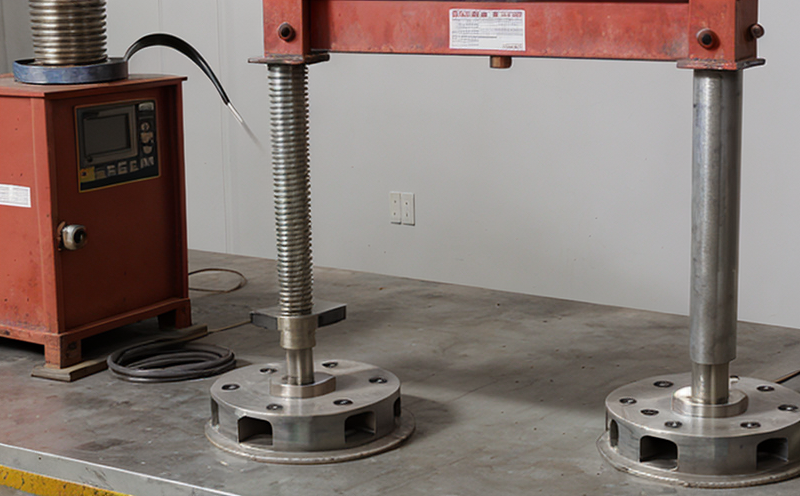Tensile testing of welded specimens
Unlock the Secrets of Welded Materials with Tensile Testing Services from Eurolab
As businesses continue to push the boundaries of innovation and technological advancements, the need for robust and reliable materials has never been more pressing. The welding process is a crucial step in many industries, including construction, manufacturing, and aerospace, where joining two or more pieces together requires precision, skill, and knowledge. However, ensuring the strength and durability of welded joints can be a daunting task.
This is where Tensile testing of welded specimens comes into play a laboratory service offered by Eurolab that provides unparalleled insight into the mechanical properties of welded materials. In this article, we will delve into the world of Tensile testing, exploring its significance, advantages, and benefits for businesses. By understanding the importance of this service, you can make informed decisions about your materials and ensure a strong foundation for your projects.
What is Tensile Testing of Welded Specimens?
Tensile testing of welded specimens is a non-destructive laboratory procedure used to evaluate the mechanical properties of welded joints under tension. The test involves applying a gradually increasing load to a specimen until it reaches its breaking point, at which stage the materials strength and ductility can be accurately determined.
This service is essential for businesses that rely on high-strength materials, such as
Construction companies building skyscrapers or bridges
Manufacturing firms producing critical components for aerospace or automotive industries
Energy producers requiring durable equipment for drilling or piping
The Advantages of Tensile Testing of Welded Specimens
Eurolabs Tensile testing of welded specimens offers numerous benefits that can significantly impact your business. Some of the key advantages include
Accurate Material Characterization
Understand the mechanical properties of welded materials, including tensile strength, yield strength, and elongation at break
Compare different welding techniques, filler metals, or material combinations to optimize performance
Improved Weld Quality Control
Detect defects or weaknesses in welds before they cause failures or accidents
Implement corrective actions to enhance weld quality and minimize rework or repairs
Enhanced Material Selection
Choose the most suitable materials for your projects based on their mechanical properties and welding characteristics
Reduce material waste, costs, and environmental impact by selecting the best materials for the job
Compliance with Industry Regulations
Meet or exceed industry standards and regulations, such as ASME, API, or AWS codes
Ensure compliance with customer specifications or contractual requirements
Increased Productivity and Efficiency
Minimize downtime and lost productivity due to weld failures or material defects
Improve overall efficiency by selecting the right materials for your projects and implementing effective quality control measures
Cost Savings through Material Optimization
Reduce material costs by selecting the most cost-effective options based on their mechanical properties and welding characteristics
Minimize waste and reduce environmental impact by optimizing material usage
Common Applications of Tensile Testing of Welded Specimens
Eurolabs Tensile testing of welded specimens is used in a wide range of industries, including
Aerospace evaluation of critical components for structural integrity
Automotive assessment of high-strength materials for chassis and body parts
Construction analysis of welds in building structures, bridges, or infrastructure projects
Energy examination of materials for drilling equipment, piping systems, or storage tanks
Frequently Asked Questions (FAQs)
Q What types of materials can be tested using Tensile testing of welded specimens?
A Eurolabs services cover a wide range of materials, including metals, alloys, and composites.
Q How do I prepare my samples for Tensile testing?
A Our experienced technicians will guide you through the sample preparation process to ensure accurate results.
Q Can I perform Tensile testing in-house or is it necessary to outsource to a laboratory like Eurolab?
A While some companies may have the resources and expertise to conduct Tensile testing, outsourcing to a specialized laboratory like Eurolab ensures accuracy, reliability, and compliance with industry standards.
Q What kind of results can I expect from Tensile testing of welded specimens?
A Our reports will provide detailed information on the mechanical properties of your materials, including tensile strength, yield strength, elongation at break, and other relevant parameters.
Why Choose Eurolab for Tensile Testing of Welded Specimens?
Eurolab is a trusted partner for businesses seeking to ensure the integrity and reliability of their materials. Our team of experts has extensive experience in conducting Tensile testing of welded specimens using state-of-the-art equipment and methodologies. By choosing Eurolab, you can
Trust our expertise and reputation for delivering accurate results
Access cutting-edge technology and specialized facilities
Benefit from customized services tailored to your specific needs
Dont gamble with the integrity of your materials choose Eurolabs Tensile testing of welded specimens to ensure a strong foundation for your projects. Contact us today to learn more about our services and how we can help you achieve your business goals.
In conclusion, Tensile testing of welded specimens is an essential service that provides unparalleled insight into the mechanical properties of welded materials. By leveraging Eurolabs expertise and state-of-the-art facilities, businesses can ensure the reliability and integrity of their materials, minimize costs and waste, and comply with industry regulations. Dont wait unlock the secrets of your materials today with Eurolabs Tensile testing services.




